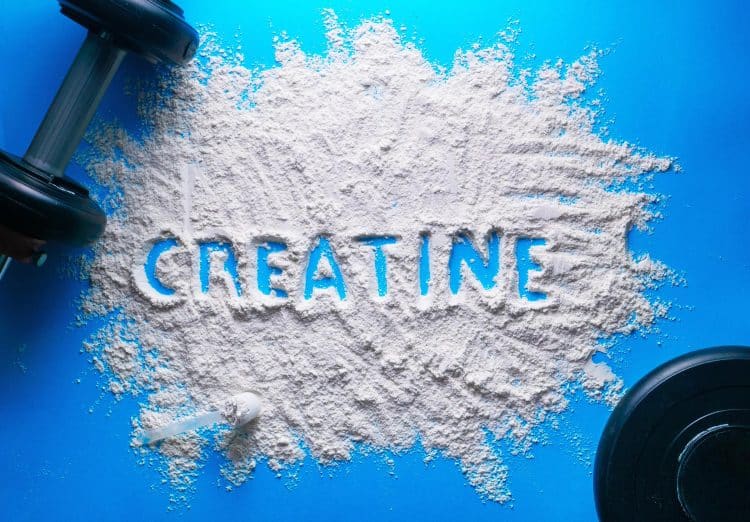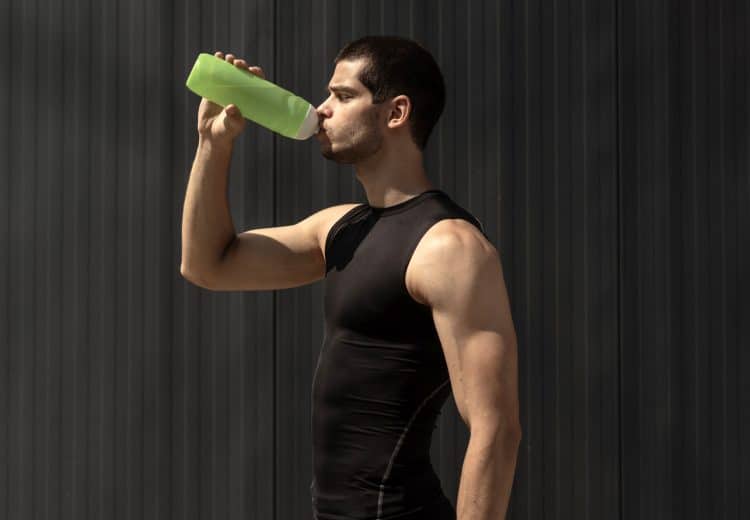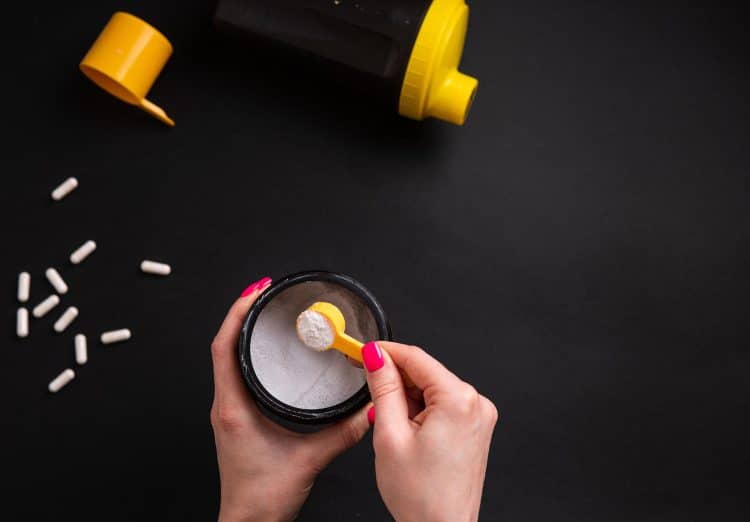The sports nutrition industry is convoluted. A few years ago, most supplement companies (and social media influencers) were going gaga over glutamine, arginine, and Tribulus. However, it wasn’t long before these supplements were disproven. Furthermore, most fad supplements have one (or rather two) things in common. First, they are hotly priced and can burn a hole in your pocket. Second, the only gains seen after taking these supplements are in the P&L statements of the manufacturers, whereas there is little to no difference in the bottom line of the lifters.
Fitness enthusiasts are a vulnerable bunch. Many supplement companies exploit their users by claiming insane results.
But enough with the rant about the supplement companies; let’s turn our attention to the true protagonist of the discussion — creatine.
Creatine is one of the most popular supplements in the sports nutrition industry. In stark contrast to all the supplements mentioned above, the sand-textured white powder is one of the most studied supps on the market. Many athletes believe it is as close to performance-enhancing drugs (PEDs) as we will ever get without violating the WADA (World Anti-Doping Agency) prohibited substance list. [1]
Contrary to what most people think, creatine is not a new supplement. Creatine was first discovered in 1832 when Michel Eugene Chevreul extracted the compound from meat. It entered the mainstream in 1992 after two Olympic gold medalists credited creatine as part of their success. [2][3]
In this article, we go over the basics of creatine, its advantages and disadvantages, dosage and safety, and the final verdict on whether you should add it to your fitness regimen.
What is Creatine?

Creatine is produced naturally in the human body from amino acids, the building blocks of protein. It is found primarily in muscle cells but is also present in the brain, central nervous system, and heart.
Creatine is also present in red meat and seafood. Creatine helps improve exercise performance and muscle mass by facilitating the recycling of adenosine triphosphate, primarily in muscle and brain tissue. This is a fancy way of saying that creatine helps shorten your rest duration between sets by replenishing your ATP reserves, allowing you to do more in a short period, which helps maintain a high training intensity.
Although creatine is produced naturally in the body and can be consumed through real food, many athletes prefer using a creatine supplement to optimize their creatine intake and get the most out of their training.
Creatine is widely used by serious lifters in supplement form; however, its use routinely generates several safety concerns. Besides talking about the pros and cons of creatine, we will also address how to take this supplement safely.
Pros of Creatine
Using creatine supplements entails several benefits, including:
Helps Boost Muscle Mass
Most people notice an improvement in overall muscle mass development within 8-12 weeks of starting supplementing with creatine.
Creatine increases adenosine triphosphate (ATP) production in the body, the primary energy source for muscle contractions. After you have built satisfactory muscle creatine stores, creatine supplements can enhance ATP synthesis, allowing for more prolonged and intense workouts, leading to greater muscle stimulation and growth. [4]
Plus, creatine improves muscle protein synthesis, which is the process by which the body builds new muscle tissue. Creatine can boost protein synthesis and increase the rate at which muscle fibers repair and rebuild after a workout. [5]
Creatine has also been shown to activate the mammalian target of the rapamycin (mTOR) pathway, a signaling pathway involved in muscle growth. This pathway regulates protein synthesis, cell growth, and muscle hypertrophy. [6]
Creatine supplements are infamous for making you retain water. Although water retention might not be ideal for an athlete on a shredding routine, others can benefit from the cell volumization delivered by creatine supplements.

Improves Strength and Energy
Creatine supplementation increases phosphocreatine (PCr) levels in the muscles, which can improve ATP regeneration. Quick ATP replenishment enhances your energy reserves, reduces muscle fatigue, and boosts recovery. Many lifters experience a sharp uptick in their strength levels after adding a creatine supplement to their stack.
A review of over 200 creatine-related studies has shown that supplementing with creatine can increase strength, power, and sprint performance by 5–15%. The study concludes that creatine supplements can promote significantly greater gains in strength, fat-free mass, and high-intensity exercise performance. [7]
Increases Recovery and Endurance
Creatine supplements can help shorten the rest duration between sets by improving your recovery. Also, it can improve your overall endurance and stamina.
The enhanced endurance and better recovery boost your overall training volume and intensity. It helps you perform more reps and sets and use heavier weights. You must ensure, however, that you are not compromising your exercise form to chase heavier weight, as it can increase your risk of injury.
By allowing for more repetitions, increased training volume, and higher workloads, creatine enables individuals to push their muscles harder and stimulate muscle growth.
May Reduce Muscle Loss in Older Adults
Studies show that creatine can slow down sarcopenia, which is an age-related, involuntary loss of skeletal muscle mass and strength. Sarcopenia is linked to physical disability, poor quality of life, and an increased risk of death. [8]
The loss of muscle mass with age results from natural hormone changes. The testosterone levels begin to drop about 1 to 3 percent a year, beginning around age 40.
Weight training combined with a creatine supplement can improve muscle health and help you retain muscle mass and volume.
Improves Cognitive Function
No, supplementing with creatine won’t turn you into Einstein or save you from flunking your math test. So, dry-scooping creatine before an exam is not a good idea.
Creatine is also found in the brain, and studies have shown that creatine supplements can help improve cognitive function by a massive 5-15% by increasing the compound’s level in your brain. [9]
A study found that consuming 5–20 grams of protein daily for a period of five days to six weeks can improve your short-term memory and intelligence or reasoning. [10]
Cost-Effective
This is one of the most underrated benefits of creatine supplements. This effective small-scooped supplement is one of the most budget-friendly supps on the market. A three-month supply of creatine costs you $25, whereas a 30-day serving of a whey protein can cost $45.
Don’t let the price of creatine fool you; they are as effective as they get. However, you shouldn’t limit your supplement stack to creatine. Combining creatine with a protein supplement will give you the best muscle and strength-building effects.
Cons and Safety Concerns of Creatine
Adding a creatine supplement to your fitness regime can have the following disadvantages:
Can Cause Bloating

Creatine can improve muscle cell hydration due to its osmotic properties, which can lead to water retention and possible weight gain as your body retains water. Many lifters do not like the additional weight gain caused by creatine use.
Since creatine is extremely hydrophilic and attracts water, you must ensure you stay hydrated throughout the day. Drink at least a gallon of water daily to reduce the risk of dehydration.
Furthermore, creatine has a chalk-like texture, which makes it hard to dissolve in water. Most people end up dry-scooping creatine, making the whole supplement experience inconvenient.
Digestive Issues and Gastrointestinal Discomfort
Although creatine supplements are generally well-tolerated, some people might experience digestive issues and gastrointestinal discomfort while taking this supp. The poor solubility of creatine monohydrate, the most popular creatine form, is often blamed for GI discomfort. However, there is no solid scientific evidence to back these claims.
Improper dosing, dehydration, and individual sensitivity can also be the reasons behind digestive issues after taking a creatine supplement. You must consult a healthcare professional if you experience any health issues while taking any supplements.
Not Suitable For People With Kidney Issues
Although many people believe that creatine use can cause kidney and liver disease, this is not the case. There is no scientific evidence to prove that using an appropriate daily dose of creatine supp can harm your organs. Creatine supplementation is safe for people following a high-protein diet.
That said, folks with impaired kidneys should always check with their healthcare providers before starting any new supplement.
Creatine Results Might Vary Depending on Your Genetics and Consumption Pattern
Like most things in bodybuilding and fitness, creatine results are not universal and can vary depending on your genetics, age, sex, fitness, and activity level. Furthermore, people that start with the loading phase might experience quicker results that folks that stick to the maintenance phase — more on this in the next section.
Omnivores naturally have higher creatine stores than vegans and vegetarians and might experience better and faster results from a creatine supp than their counterparts. Although noticeable muscle mass change might take 8-12 weeks, you’ll start seeing the strength and endurance benefits of creatine within a few weeks as soon as your muscle creatine levels reach the point of saturation.

Confusion About The Best Form of Creatine
Whenever a new supplement is launched, sports nutrition companies tend to milk the product by introducing different variations of the supp and claiming the latest to be better than the rest. It is no different with creatine supplements.
The six most popular types of creatine include monohydrate, ethyl ester, hydrochloride, buffered, magnesium chelate, and liquid creatine. Creatine monohydrate is the oldest and most-tested variation, and you should stick with it to build muscle mass and strength.
How To Use Creatine Safely
Creatine is one of the most researched and safest supplements. Nonetheless, you must keep a few things in mind to ensure safety.
- Brand: You should only opt for reputable brands. Since creatine is usually low-priced, many companies enter the sports nutrition market by offering low-quality creatine, which can hamper your overall health.
- Use a Suitable Form: Some people react to one form of creatine better than the other. For example, you might see great results from creatine monohydrate, whereas your training mate might be a fan of creatine HCL.
- Dosage: Choose your creatine dose depending on your tolerance and other symptoms.
- Hydration: Drink at least a gallon of water daily while supplementing with creatine.
You must stop creatine use immediately if you experience any health issues, such as acne, diarrhea, hair loss, digestive issue, or GI discomfort, and seek a medical professional’s advice before resuming the supplement use.
[sc name=”style-summary2″ ]
Check Out: Creatine Calculator
[/sc]
How To Take Creatine
There are two most popular methods of taking a creatine supplement:
Loading Phase
The loading cycle results in rapid muscle creatine level saturation. In this phase, an individual takes 20 grams of creatine daily for five to seven days. Based on his convenience, the user can split his creatine intake into four five-gram servings or five four-gram doses.
Following the five to seven days, you must switch to consuming 3–5 grams daily to maintain your creatine reserves and optimize muscle and strength gains.

Maintenance Phase
Consuming four to five daily servings of creatine can be overwhelming for most folks. You could begin your creatine intake with the maintenance phase to save yourself the hassle.
In the maintenance phase, you consume 3-5 grams of creatine daily. However, this technique may take 3–4 weeks to maximize your creatine stores. Conversely, you reach creatine saturation within seven days using the loading phase.
Notably, there is no benefit to creatine cycling. You could stick to the maintenance phase from the beginning and will get the same benefits as the loading phase in the long run.
Most omnivores consume between one to two grams of creatine daily through their natural diet, which makes their creatine stores 60%–80% full. Even an omnivore must use a creatine supplement to maximize their creatine reserves. The loading phase, which involves consuming 20 grams of creatine daily for five to seven days, boosts muscle creatine stores by 10–40%.
People with greater muscle mass generally require more creatine intake to reach creatine saturation and get the desired results from this supplement.
[sc name=”style-summary-2nd” ]
Check Out: 12 Best Creatine Supplements
[/sc]
FAQs
I am a beginner and only do cardio. Should I take creatine?
Creatine can help improve your strength, power, total work capacity, and muscle mass and can be used by anyone. However, this supplement works best for athletes that train at very high workloads and need a spike in their power, endurance, and stamina to take their training to the next level.
That said, research shows that creatine also has therapeutic benefits, which can prevent muscle loss in older adults, reduce the risk of vascular disease, and improve brain health. These benefits make creatine supplementation suitable for everyone, even folks that do not train.
Does creatine cause muscle cramps?
Some users report muscle cramps after taking a creatine supplement. However, there is no conclusive scientific evidence to prove a link between the two. A possible reason for cramps could be that most people usually train harder after taking creatine, which could lead to muscle cramps. Plus, a high training intensity could cause dehydration and inadequate electrolyte balance, leading to muscle cramps.
Do I need to eat meat and fish for optimal natural creatine production in my body?
This is one of the most common questions from vegans and vegetarians about creatine. The short answer to this question is — no; your body can produce the required creatine endogenously, and you do not need to eat meat to optimize its natural production.
However, taking a creatine supplement can boost your creatine stores, which can give you better results.
Final Verdict
Creatine is one of the most studied and safest supplements. It can help you build and retain muscle, improve your overall strength and cognitive function, boost your recovery, and reduce age-related muscle loss. While each supplement has its advantages and disadvantages, creatine’s pros far outweigh its cons.
While advanced athletes are best positioned to get the most benefits from a creatine supplement, nothing is stopping a beginner from taking it. Furthermore, elderlies should use a creatine supplement for its therapeutic benefits.
Whether you choose the loading or maintenance phase, you must build optimal muscle creatine stores before you can expect results.
Ensure that you use a good brand and stay hydrated for the best results. So, what are you waiting for? Grab that little white-powdered scoop and head to the gym for your PR. Best of luck!
References
- Hall M, Trojian TH. Creatine supplementation. Curr Sports Med Rep. 2013 Jul-Aug;12(4):240-4. doi: 10.1249/JSR.0b013e31829cdff2. PMID: 23851411.
- Butts J, Jacobs B, Silvis M. Creatine Use in Sports. Sports Health. 2018 Jan/Feb;10(1):31-34. doi: 10.1177/1941738117737248. Epub 2017 Oct 23. PMID: 29059531; PMCID: PMC5753968.
- Close GL, Hamilton DL, Philp A, Burke LM, Morton JP. New strategies in sport nutrition to increase exercise performance. Free Radic Biol Med. 2016 Sep;98:144-158. doi: 10.1016/j.freeradbiomed.2016.01.016. Epub 2016 Feb 5. PMID: 26855422.
- Lanhers C, Pereira B, Naughton G, Trousselard M, Lesage FX, Dutheil F. Creatine Supplementation and Upper Limb Strength Performance: A Systematic Review and Meta-Analysis. Sports Med. 2017 Jan;47(1):163-173. doi: 10.1007/s40279-016-0571-4. PMID: 27328852.
- Ingwall JS, Weiner CD, Morales MF, Davis E, Stockdale FE. Specificity of creatine in the control of muscle protein synthesis. J Cell Biol. 1974 Jul;62(1):145-51. doi: 10.1083/jcb.62.1.145. PMID: 4407046; PMCID: PMC2109188.
- Sun M, Jiao H, Wang X, Li H, Zhou Y, Zhao J, Lin H. The regulating pathway of creatine on muscular protein metabolism depends on the energy state. Am J Physiol Cell Physiol. 2022 May 1;322(5):C1022-C1035. doi: 10.1152/ajpcell.00447.2021. Epub 2022 Apr 13. PMID: 35417269.
- Kreider RB. Effects of creatine supplementation on performance and training adaptations. Mol Cell Biochem. 2003 Feb;244(1-2):89-94. PMID: 12701815.
- Candow DG, Forbes SC, Kirk B, Duque G. Current Evidence and Possible Future Applications of Creatine Supplementation for Older Adults. Nutrients. 2021 Feb 26;13(3):745. doi: 10.3390/nu13030745. PMID: 33652673; PMCID: PMC7996960.
- Dechent P, Pouwels PJ, Wilken B, Hanefeld F, Frahm J. Increase of total creatine in human brain after oral supplementation of creatine-monohydrate. Am J Physiol. 1999 Sep;277(3):R698-704. doi: 10.1152/ajpregu.1999.277.3.R698. PMID: 10484486.
- Avgerinos KI, Spyrou N, Bougioukas KI, Kapogiannis D. Effects of creatine supplementation on cognitive function of healthy individuals: A systematic review of randomized controlled trials. Exp Gerontol. 2018 Jul 15;108:166-173. doi: 10.1016/j.exger.2018.04.013. Epub 2018 Apr 25. PMID: 29704637; PMCID: PMC6093191.


